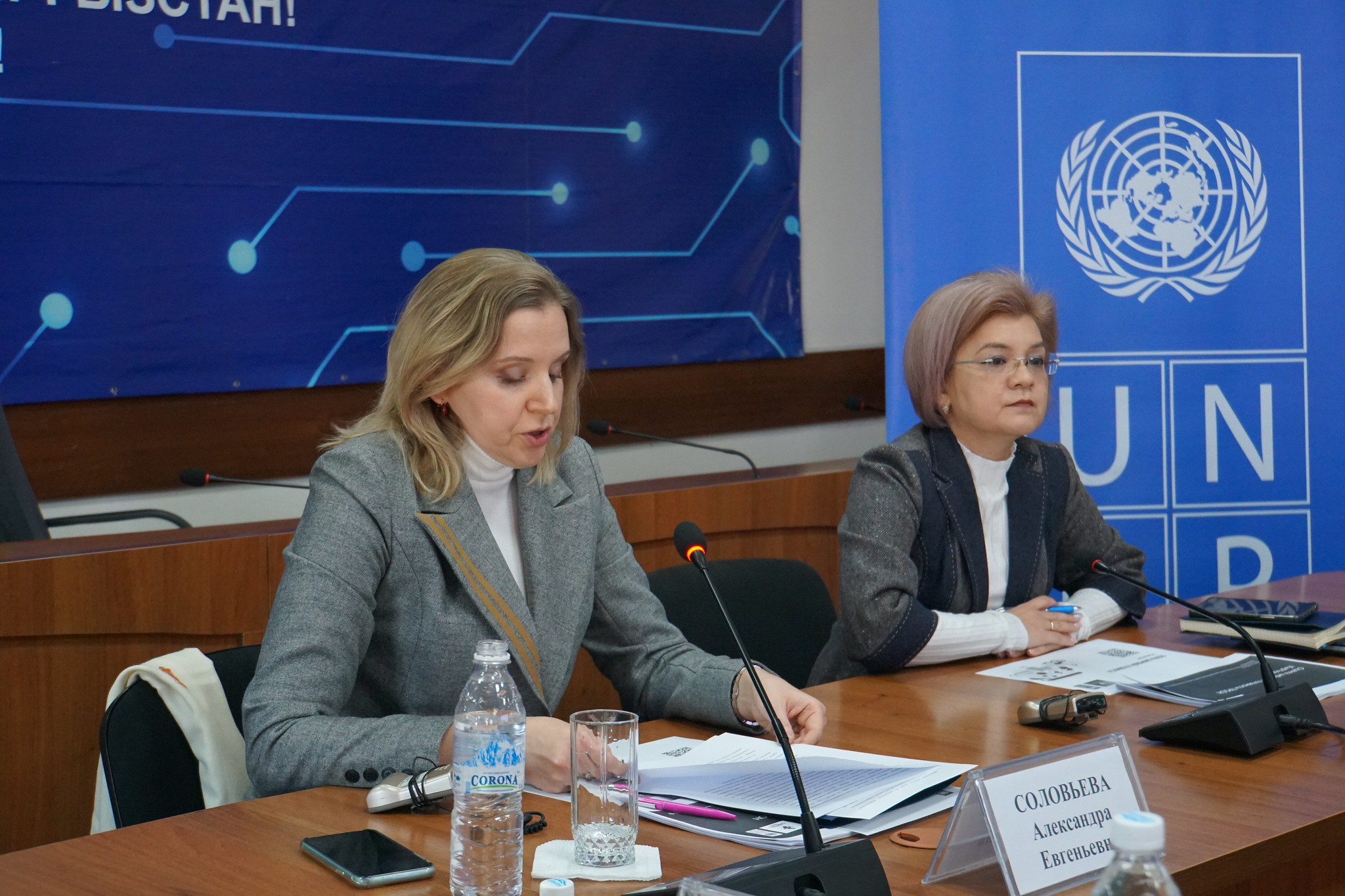On 13 December, the United Nations Development Programme (UNDP) presented the Digital Readiness Assessment results to the Ministry of Digital Development and held discussion around its key recommendations to enhance digitalization in the Kyrgyz Republic.
Advancing Digital Transformation in Kyrgyzstan: A Joint Effort for Sustainable Development
December 16, 2023

Alexandra Solovieva delivers opening remark at the validation workshop.
On 13 December, the United Nations Development Programme (UNDP) presented the Digital Readiness Assessment results to the Ministry of Digital Development and discussed its key recommendations to enhance digitalization in the Kyrgyz Republic.
“The Digital Readiness Assessment is a good tool that will allow us to assess our present state, understand and respond to a rapidly changing environment of opportunities and threats, and support us in developing a coherent vision. I am convinced that the assessment will also make a certain contribution to accelerating digital transformation in the Kyrgyz Republic”, said Nuria Kutnaeva, Minister of Digital Development.
With digitalization being a key national development priority, the Kyrgyz Republic has been making substantial progress in various domains, including digital government services, financial technology, and telecommunications. The nation stands as a pioneer in regulating digital technologies with its groundbreaking initiative, the Digital Code that is developed to bring all digital norms into a common legal field.
In response to a fast-evolving digital landscape accentuated by the COVID-19 pandemic, the Kyrgyz Republic has recognized the dual nature of digitalization as a catalyst for socio-economic progress and a challenge that can exacerbate existing disparities.
As underlined in UNDP’s Digital Strategy 2022-2025, digital is a critical enabler of sustainable development. “While strides have been made, there is an important need for comprehensive, whole-of-government, and whole-of-society approaches to ensure that digital technologies drive not only economic growth but also contribute significantly to societal well-being and the achievement of the Sustainable Development Goals (SDGs), and to ensure that no one is left behind”, said Alexandra Solovieva, UNDP Resident Representative.
As the "Digital Kyrgyzstan" concept (Sanarip Kyrgyzstan) for 2019-2023 nears its culmination, 2023 is a pivotal year for shaping the national vision for digital transformation. To assess progress and lay the foundation for future endeavors, the Ministry of Digital Development, in collaboration with UNDP in Kyrgyzstan and the UNDP Chief Digital Office, initiated a Digital Readiness Assessment process earlier this year.
This assessment builds on both quantitative and qualitative data and integrates diverse stakeholders’ perspectives.
Based on the results of the Digital Readiness Assessment, Kyrgyzstan is considered as a country that systematically applies digital tools and approaches, including establishing strong progress in building robust digital foundations and structures within and beyond the government. The Digital Readiness Assessment (DRA) shares recommendations for Kyrgyzstan in five overarching areas: Infrastructure, Government, Regulations, Business, and People.
Infrastructure. In conjunction with ongoing digital initiatives, the DRA recommends that Kyrgyzstan further improves connectivity, including implementation of targeted policies to drive last-mile connectivity, shaping a National Broadband Strategy, and building a 5G testbed and trials programme. Kyrgyzstan is committed to exploring a 'triple helix' approach, involving academia in digital R&D and innovation for infrastructure enhancement. Efforts are to be made to build a robust monitoring and evaluation process to continuously improve connectivity.
Government. Recognizing the significance of online public services, Kyrgyzstan is suggested to raise awareness of citizens and educate them through the deployment of more systemic approaches, so that people could benefit from digital service provision by the government and be inclusively integrated into the digital future. Further, establishing robust feedback mechanisms with the user should significantly contribute to high-quality needs-based public service provision. Another important area of further work is strengthening civil servants’ digital skills for improved public administration. A digital project management framework could be created for better coordination and traceability of digital projects along with a dashboard to track government analytics. Kyrgyzstan is encouraged to address Artificial Intelligence (AI) advancements by shaping a national AI strategy and roadmap and responding to challenges posed by increasing urbanization rates with more holistic policy approaches consolidated into a smart city strategy.
Regulations. Along with a continuous focus on effective implementation of its digital legislation and regulations, Kyrgyzstan is advised to further explore future-looking regulatory opportunities to foster innovation through initiatives such as regulatory sandboxes. Implementation of the Open Data Action Plan and strengthening cooperation under the Open Government Partnership, development, and implementation of an open data law are among key priorities to promote data-driven governance and data-to-policy approaches. Comprehensive cybersecurity policy and regulation is another priority area for efforts towards inclusive and just digital transformation. Achieved progress in e-commerce facilitation, in particular with the “Programme on supporting and development of e-commerce in Kyrgyzstan for 2023-2026”, should be further strengthened with monitoring and evaluation practice to ensure agility in policy implementation.
Business. To foster its startup ecosystem, Kyrgyzstan is recommended to investigate opportunities to benefit from the engagement of the diaspora. A digital transformation diagnostic is required to better accommodate the digital needs of the private sector, identify growth areas, and partner with Big Tech for training. The country can work towards making global platforms accessible to local businesses with options of customization and configuration, while also supporting entrepreneurs seeking funding from abroad through a dedicated helpdesk. To promote sustainable development, the government can consider adopting of a proactive approach in encouraging the market to build innovative and sustainable products.
People. Acknowledging the digital skills gap among the top challenges of the national digital change, Kyrgyzstan could adopt a digital skills strategy to systematically address the upskilling needs of the different groups of the population. To bridge the gap and promote inclusivity, it is essential to extend the availability of digital skills training beyond urban areas and focus on underserved areas. Opportunities to improve the accessibility of computers should be also explored, e.g. via specific subsidies, partnerships, and broader initiatives such as spreading community computer centers in under-served areas. Increasing the relevance of digital content and localization of digital products and services to local context are crucial areas of work to ensure increasing motivation of citizens to meaningfully engage with digital technologies. Digital-skilled youth employment will be to a high extent driven by dynamics of public-private partnerships through job creation and ongoing efforts to promote female representation in the ICT sector will yield harnessing untapped talent and productivity gains. The government should also develop a dialogue and collaborate with the private sector to address workplace inclusivity to sustain digital dividends for all.
As Kyrgyzstan continues its commitment to digital transformation, these recommendations underscore the importance of a holistic, collaborative approach involving government, business, and the wider community. We look forward to continued progress and collaboration in shaping a digital future that leaves no one behind.

 Locations
Locations






